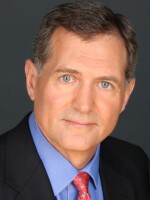RACHEL MARTIN, HOST:
President Trump has repeatedly been at odds with U.S. government experts, especially those specializing in Russia and Ukraine, instead relying on his close inner circle of advisers. Now, some of those specialists are speaking out against the president and have become key figures in the impeachment investigation.
Here's NPR national security correspondent Greg Myre.
GREG MYRE, BYLINE: Andrew Weiss served previously at the Pentagon, the State Department and the National Security Council as a specialist on Russia and the former Soviet states. Several months ago, he sensed something strange was going on with U.S. policy towards Ukraine.
ANDREW WEISS: It was clear in the late spring that the right-wing media machinery was ginning up a series of totally false and baseless accusations about career people working on U.S. policy.
MYRE: Weiss, now at the Carnegie Endowment for International Peace, is one of many specialists in this field who say President Trump's refusal to listen to advisers has led to muddled policies on Russia and the impeachment investigation surrounding Ukraine.
WEISS: A little bit of time with experienced Russia experts would have basically road-tested these ideas. But Trump and his inner circle were very content not to bring any of those people into the discussion.
MYRE: This friction was evident before Trump entered the Oval Office. The CIA and other intelligence agencies briefed the president-elect on their conclusion that Russia interfered with the 2016 presidential election. Trump repeatedly expressed doubts, most notably when standing next to Russian President Vladimir Putin at a summit last year in Helsinki, Finland.
(SOUNDBITE OF ARCHIVED RECORDING)
PRESIDENT DONALD TRUMP: I will tell you that President Putin was extremely strong and powerful in his denial today.
MYRE: On military issues involving Russia, the president has rejected the guidance of Pentagon advisers on matters ranging from arms control to U.S. troops in the Middle East. The most dramatic example is Syria, where withdrawing U.S. forces were immediately replaced by Russian troops. And for all this talk about Russia, analysts say the president has never articulated a clear policy.
ANGELA STENT: We have the policy of the president, which is to improve ties to Russia, make a deal with Russia. So far, that hasn't gone very far.
MYRE: Angela Stent heads the Russia program at Georgetown University. She served at the State Department. And her latest book on Russia is called "Putin's World." It's commonplace, she says, for government agencies to have vigorous, contentious debates about Russia. However, today, there's a broad consensus that the U.S. should stick to a tough line, and that includes Trump's own party.
STENT: The majority of congressional Republicans take a very skeptical view of Russia. And they've supported all of these sanctions.
MYRE: Michael McKinley, who is an ambassador to several countries and a top aide to Secretary of State Mike Pompeo, recently resigned after 37 years at the State Department. He appeared before congressional investigators on Wednesday and said he was leaving in part because U.S. ambassadors were being used to advance domestic political objectives. He specifically cited Ukraine. White House Chief of Staff Mick Mulvaney fired back.
(SOUNDBITE OF ARCHIVED RECORDING)
MICK MULVANEY: McKinley said yesterday that he was really upset with the political influence in foreign policy. That was one of the reasons he was so upset about this. And I have news for everybody - get over it. There's going to be political influence in foreign policy.
MYRE: Andrew Weiss acknowledges that every president gets to pursue the policy he chooses. But he adds...
WEISS: The idea of getting along with Putin was an end in itself. There were almost no Republican, Democratic or career national security experts who could have advocated or even intellectually supported such an idea.
MYRE: Earlier this month, Angela Stent traveled to Russia for an annual event hosted by the Russian leader.
STENT: And President Putin sat on the stage, and he praised Donald Trump for what he had done.
MYRE: Putin is a constant critic of the United States, she notes, but he always has kind words for President Trump.
Greg Myre, NPR News, Washington. Transcript provided by NPR, Copyright NPR.



